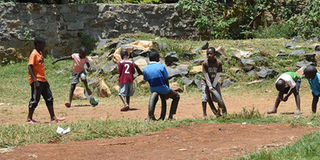Children can get infected by virus, after all

Children play at Kisumu Ndogo Estate in Eldoret town, Uasin Gishu County, on March 17, 2020. Schools were closed due to the Covid-19 outbreak. PHOTO | JARED NYATAYA | NATION MEDIA GROUP
What you need to know:
- If you are an infected adult, don’t get close to your young ones, says CS
- But fatalities unlikely to be high since the risk of complications rises with age.
- Babies can get infected by their mothers when breastfeeding, adding that, with adults now spending more time at home, such cases could rise in the coming weeks.
- But he added that fatality is likely to be low because they get milder symptoms compare with adults.
The high number of children who have tested positive for Covid-19 in the last few weeks is a clear sign that they are not immune to the disease.
“At the beginning of the pandemic, many thought that children were not getting infected, but children are also at risk when they are in close contact with the infected adults,” said Dr Patrick Amoth, Director-General, and Ministry of Health.
Data from the ministry showed that 399 cases of the disease have been reported among children below the age of 10 (6.29 per cent) and 270 cases among those between the ages of 11 and 19 (4.22 per cent) with fewer than five deaths.
Dr Amoth said that babies can get infected by their mothers when breastfeeding, adding that, with adults now spending more time at home, such cases could rise in the coming weeks. But he added that fatality is likely to be low because they get milder symptoms compare with adults.
On Tuesday, the country recorded 176 (100 males and 76 female) new cases out of the 2,419 samples tested in 24 hours, bringing the case load to 6,366 from a cumulative figure of 169, 826 tests done since the country recorded its first case on March 13.
The youngest was a three-year- old and the oldest, 78.
Explaining why deaths in children are unlikely to be high, the Centres for Disease Control said the risk of serious complications and death rises with age.
Since children often get colds, they might have antibodies that offer them some protection against Covid-19. It’s also possible that children’s immune systems interact differently with the virus from the ways adults’ do.
Some adults get sick because their immune systems seem to overreact to the virus, causing more damage to their bodies. This is less likely to happen in children.
A study of more than 2,100 children with suspected or confirmed Covid-19 in China showed that just under 11 per cent of infants had severe or critical illness, with seven per cent aged one to five.
Newborns got infected during childbirth or by exposure to sick caregivers after delivery.
For instance, in the last week, a three-week-old and a six-month-old were among the confirmed cases.
Health Cabinet Secretary Mutahi Kagwe urged Kenyans to ignore myths about the disease.
“The myth that young people can’t get the disease is false. We should take good care of our young ones. If you are an adult and starts showing the signs, don’t get close to your young ones, observe the safety measures,” Mr Kagwe said.
“This is the time to close your doors and entertain only your family members; not visitors. They might turn out to be carriers of the virus,” he added.
While giving an update on the Covid-19 situation, Health Chief Administrative Secretary Rashid Aman said Nairobi had recorded the highest number of infections with 99, followed by Mombasa with 20, Kiambu 17, Migori 13, Uasin Gishu 10, Kajiado and Busia four cases each, while Kilifi had three. Makueni, Machakos, Narok and Kisumu had two cases each with Kakamega, one case.
Meanwhile, 26 patients were discharged, bringing the number of recoveries to 2,039, while four succumbed to the disease, bringing the total number of deaths to 148.





